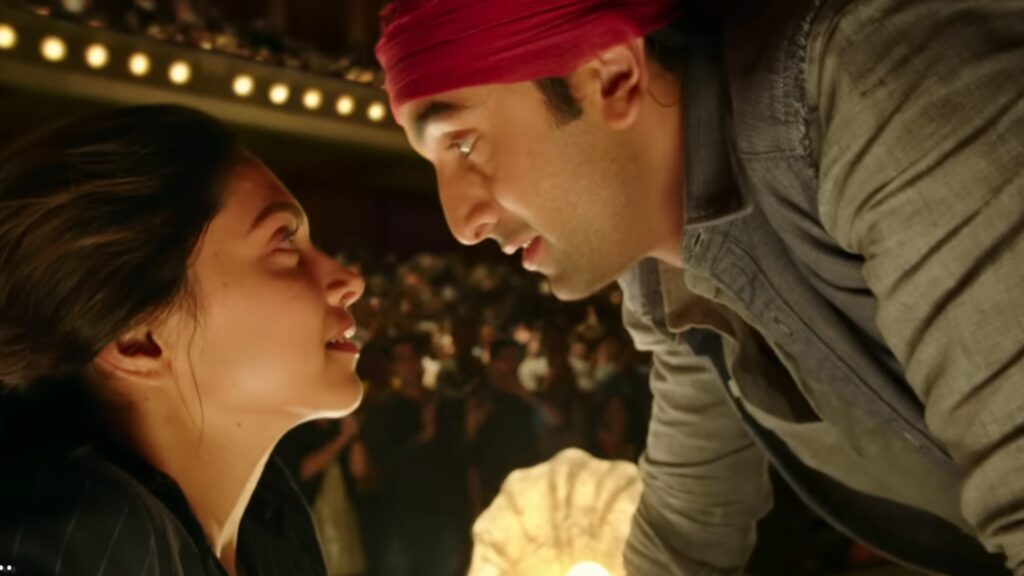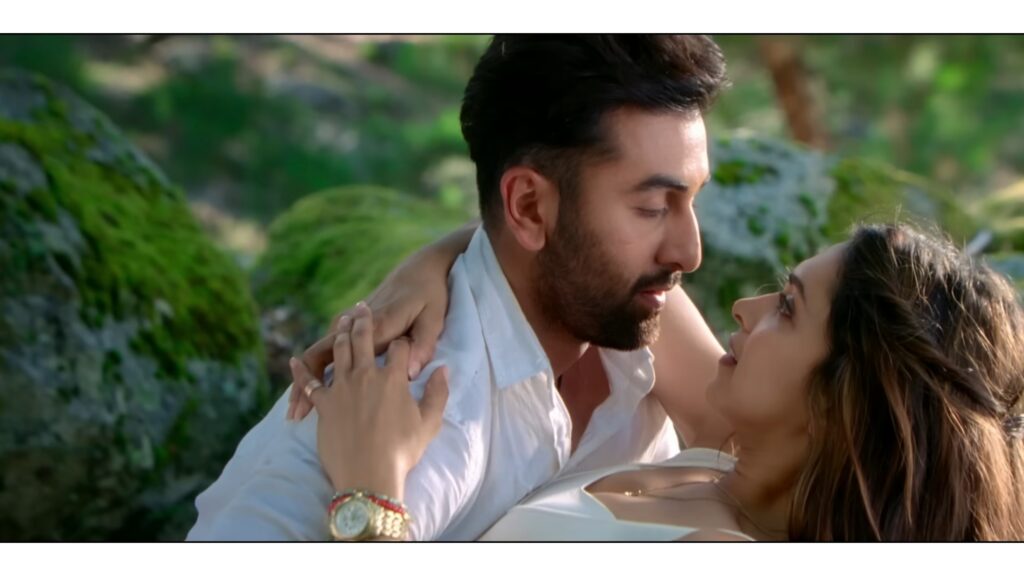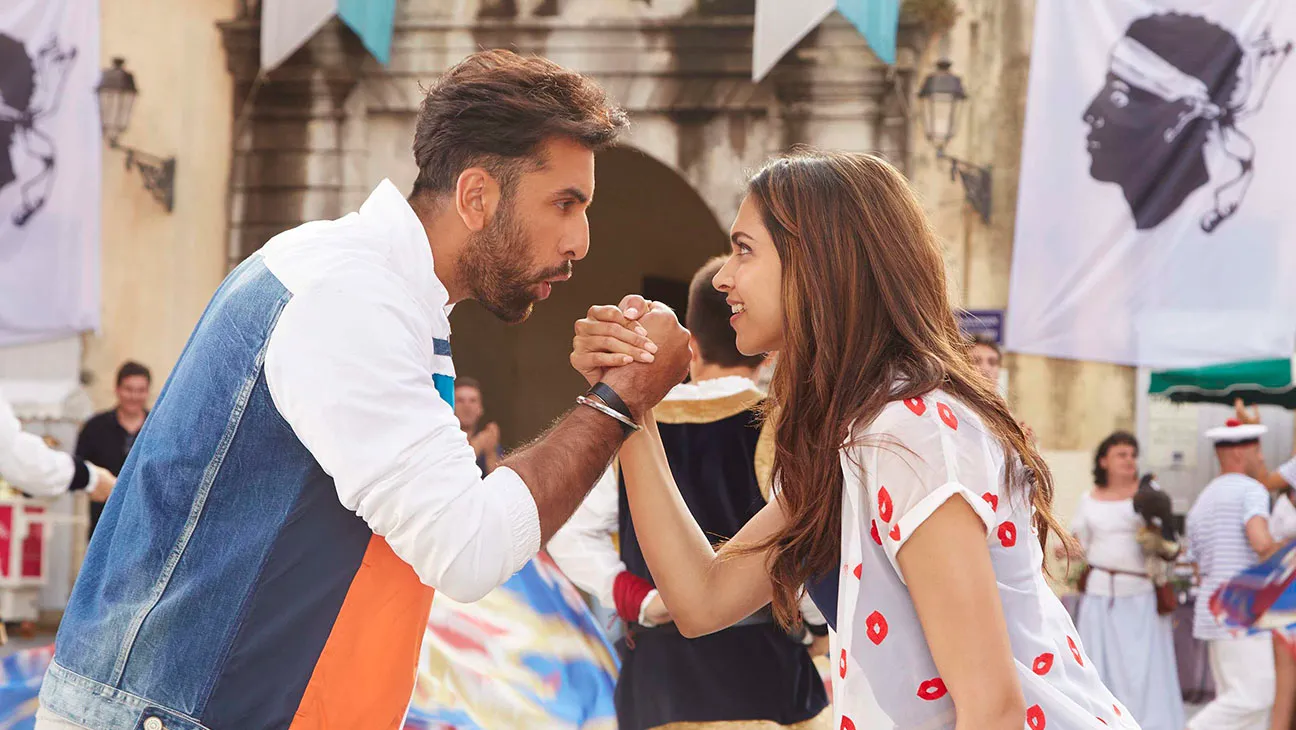Tamasha is revered not just for its storytelling and strong performances but for its profound exploration of self-discovery. The film critiques societal norms while celebrating the journey toward personal freedom.
Filmmakers are creatures of habit, and the great ones sew narratives into a plot like one sews a fabric together. It’s a fine line; see the seams too clearly, and you lose interest in the plot. But with the very best ones, the journey is so captivating that even when you can see each thread going into the cloth, you can’t take your eyes off it. Imtiaz Ali falls into the category of such a filmmaker.
Having won us over through gems like Jab We Met, Love Aaj Kal, Highway, and Rockstar, his calling card has been to explore one’s need to find purpose and a sense of identity. In 2015, he gave us Tamasha, the film that, to many, has become the definitive movie about living life on your terms.
Ranbir Kapoor and Deepika Padukone deliver memorable performances in the movie. Kapoor plays Ved Vardhan Sahni, a creative individual who suppresses his true passions to maintain a strict role as a product manager in a corporate setting. During a short European trip (who knew Corsica was so beautiful?), Ved encounters Tara, portrayed by Padukone, an imaginative young woman who draws out his more adventurous side. Although they feel a strong connection, they part ways as the vacation ends and life returns to its usual pace. Five years later, Tara and Ved cross paths again, deciding to explore their feelings for each other. The movie’s central theme is how Ved’s internal conflicts and repressed desires influence their budding relationship.
A Return to Our Authentic Self
With films that explore deeply personal themes, interpretations of the underlying message can vary widely. Tamasha is no different. Some viewers see it as a classic hero’s journey. In this perspective, the story follows a straightforward arc where a mentor — in this case, Tara — appears to rouse the hero from his mundane existence. She challenges him with difficulties that help him recognize and embrace his inner hero, completing his transformation.
Others interpret the film as a compelling exploration of authenticity and the courage to pursue genuine interests. It strongly critiques societal expectations, urging the audience to reconsider their assumed roles and discover the wilder, uninhibited parts of their personalities.
But there’s a third theme in which you must think of the central characters as part of a single entity. Ved is the brain; Tara is the beating heart. Together, they make the two ends of the eternal fight over choosing what’s best for oneself. It’s the story of trying to be yourself in a world that tries to make you like everyone else.
There’s a scene at the end of Tamasha that crystallizes the movie’s essence. There’s a stage play going on, and one of the characters compares childhood to a snake that needs to be stomped on and killed before it raises its head. Only then can one live a life of peace without worrying about useless things such as dreams, desires, and hopes.
Tamasha Unpacks Something New Each Time You Watch it

When Tara loses that “bag jo kabhi khona nai chahiye,” it seems her panic is directed at the prospect of losing her identity and passport. But then, as the movie unspools and you look at that pivotal moment with the hindsight of them deciding to keep each other’s identity a secret, the lost bag becomes a substitute for a mask they take off to be their true selves. They reveal to each other a side of themselves that they let out when no one is around. In a sense, their truest version.
Also Read: Is Bollywood in a Slump?
Tamasha Gives Us Real Characters with Dreams and Fears

There are so many poignant and telling moments in Tamasha that one can relate to. After getting fired, Ved returns home and looks for the curbside storyteller of his childhood. He’s blind, disabled, and old now. When the storyteller tries to tell him the same tales, Ved isn’t satisfied. In a fit of rage, the blind man rebukes Ved for being a coward and asking someone else to narrate his fate. It’s as if the blind man, in a fit of lucidness, is telling Ved to seize the reins of his life. Ved accepts the old man’s advice by confronting his father and opening his heart to him. That was such a telling moment, narrated in a very familiar way by Imtiaz. Fathers have this unspoken aura in a typical South Asian household where all is conveyed through raised eyebrows and breathing patterns. For a son to disappoint his father is the ultimate betrayal. We collectively held our breath when Ved finally got the nerve to face his father.
The moment where Ved is vulnerable and honest is so heartbreaking and poignant. Kudos to Javed Sheikh for playing the typical dad to Ranbir Kapoor’s lost, aimless kid. His gruff, hard exterior, which hides dreams and fears and ultimately boundless love for his child, was effortless and genuine.
When We Are Seen, The Experience is Both Exhilarating and Scary

The scene where Ved decides to meet Tara after they’ve broken up forms the essence of the film. Sometimes, you fear those people who can see through you. And in a very twisted way, you want them to untangle you while, at the same time, you appear to be trying to push them away. It’s a defence mechanism that people who’ve been abandoned develop to cover their vulnerability.
Once he knows that Tara sees both versions of him, Ved can’t keep the mask up any longer, and that’s when the conflict emerges. Now Tara’s in on the battle that Ved’s been fighting all his life, and that amount of light on his inner struggle blindsides him as well, and he’s having trouble dealing with the attention he so desperately wants. He wants her to be there, but he can’t let her see the mess that he is. It’s a contradiction in him. But then, isn’t that how we all are at our lowest? And that’s where the connection happens.
At some level, Ved knows his trigger points and how they might appear to a stranger. While he basks in the sunlight of Tara’s attention, and although he knows that what she says is true, he can’t stop himself from being aggressive and mean to her overtures. It’s almost childish. Wanting attention and love yet pushing her away. In fact, his actions are the biggest giveaway to his true feelings. You are your truest self with the ones you truly love. We throw tantrums around our loved ones because it’s their love that we know runs the deepest. If you love somebody more, you can hurt them more. It’s the bedrock of our existence. Identities are very fluid in life; sometimes, we search for the same level of love in different identities. It’s almost as if Ved is looking for the unshakeable love and support that a child would want from a parent in Tara. And she responds.
She sees him as he is when no one is around, and she still loves him. It’s this sense of coming into the light for the first time and being accepted, even loved, that overwhelms him, and he tries to push her away, all the while wanting her to fight off his retreats and still come for him.
We Are Different Persons with Different People

We are so many versions of ourselves at so many points that knowing who the real version is can be difficult at times. Certain people can bring out the real you. Tara brings out the real Ved, the childlike, dreamy, story-loving kid that he’d had to lock up as he grew into adulthood. When Tara brings him out, there are two versions of Ved at war: the child, who has been locked up all these years, who is happy to be out, and who is also sulking and throwing a tantrum. And the grown-up Ved, who is both scandalized and baffled at this version of him, wants to lock him back up. That can only be done by pushing out Tara. It’s not contradictory and not normal, and he is aware of it but can’t help himself. We are all on the spectrum when it comes to psychiatric conditions, and in moments of emotion, we do swing to the extremes. Ved is no different. At the lowest moment, he is just like us.
He goes off and hides, but he wants to be found. It’s a gentle tug of war as you coax and nudge a child into the light. And in the end, when she sits down, it’s as if to say, “I’m here, and I’m not leaving, but you have to walk to me now.”
It resonated with many because it validated the desire to respond to things at a very primitive level despite society’s norms and expectations.
Tamasha is Imtiaz Ali Firing on All Cylinders

Imtiaz Ali’s films have a very authentic, almost amateurish feel, which adds to their genuineness, and Tamasha is no different. Every element of the film shines brilliantly, from Imtiaz Ali’s adept direction to the poetic lyrics by Irshad Kamil and A.R. Rahman’s enchanting musical score. The film masterfully weaves elements of fantasy with the harsh realities faced by the characters, revealing the deep-seated conflicts driving the protagonist, Ved. The plot cleverly alternates between timelines, uncovering Ved’s struggles and introspective journey through its thoughtful narrative.
Ranbir Kapoor delivers a standout performance as Ved, capturing the intricate emotions of a man caught between conforming to societal norms and pursuing his true desires. Transitioning from a whimsical wanderer to a constrained corporate figure, Ranbir displays remarkable range in his acting. Deepika Padukone is equally impressive as Tara, embodying a strong, self-reliant woman with a tender side. Their dynamic on-screen relationship is electrifying and tender, enhancing the emotional depth of their shared storyline.
The music composed by A.R. Rahman, paired with Irshad Kamil’s lyrical genius, brings a layer of enchantment to the movie. Tracks such as “Agar Tum Saath Ho” and “Tu Koi Aur Hai” resonate deeply, stirring a spectrum of emotions and enriching the film’s atmosphere. They linger with the audience well beyond the viewing experience.
But in the end, it’s the message that resonates the greatest — the power to let the real us out lies also within us. We don’t have to wait for someone else to come and tell us who we are. All we need to do is take off the mask and show the world our true selves.
Everything else will take care of itself.




